Related Research Articles
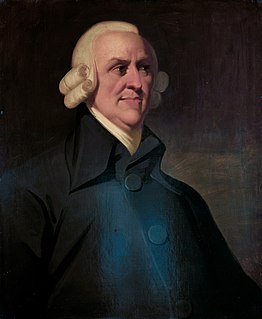
Adam Smith was a Scottish economist and philosopher who was a pioneer of political economy and key figure during the Scottish Enlightenment. Also known as "The Father of Economics" or "The Father of Capitalism", he wrote two classic works, The Theory of Moral Sentiments (1759) and An Inquiry into the Nature and Causes of the Wealth of Nations (1776). The latter, often abbreviated as The Wealth of Nations, is considered his magnum opus and the first modern work of economics. In his work, Smith introduced his theory of absolute advantage.
Classical liberalism is a political ideology and a branch of liberalism that advocates free market and laissez-faire economics; civil liberties under the rule of law with an emphasis on limited government, economic freedom, and political freedom. It was developed in the early 19th century, building on ideas from the previous century as a response to urbanization and to the Industrial Revolution in Europe and North America.
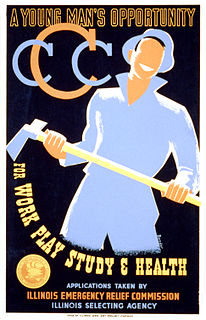
The Civilian Conservation Corps (CCC) was a voluntary public work relief program that ran from 1933 to 1942 in the United States for unemployed, unmarried men ages 18–25 and eventually expanded to ages 17–28. Robert Fechner was the first director of this agency, succeeded by James McEntee following Fechner's death. The CCC was a major part of President Franklin D. Roosevelt's New Deal that supplied manual labor jobs related to the conservation and development of natural resources in rural lands owned by federal, state, and local governments. The CCC was designed to supply jobs for young men and to relieve families who had difficulty finding jobs during the Great Depression in the United States. The largest enrollment at any one time was 300,000. Through the course of its nine years in operation, three million young men took part in the CCC, which provided them with shelter, clothing, and food, together with a wage of $30 per month.

Pacifism is the opposition or resistance to war, militarism or violence. The word pacifism was coined by the French peace campaigner Émile Arnaud and adopted by other peace activists at the tenth Universal Peace Congress in Glasgow in 1901. A related term is ahimsa, which is a core philosophy in Indian Religions such as Hinduism, Buddhism, and Jainism. While modern connotations are recent, having been explicated since the 19th century, ancient references abound.

Norwich is a town in Windsor County, in the U.S. state of Vermont. The population was 3,612 at the 2020 census. Home to some of the state of Vermont's wealthiest residents, the municipality is a commuter town for nearby Hanover, New Hampshire across the Connecticut River. The town is part of the Dresden School District, the first interstate school district in the United States, signed into law by President John F. Kennedy. The town contains the Norwich Mid-Century Modern Historic District.
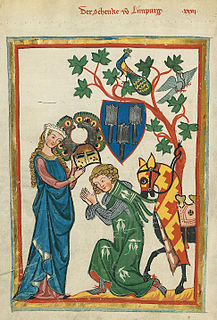
Chivalry, or the chivalric code, is an informal and varying code of conduct developed between 1170 and 1220. It was associated with the medieval Christian institution of knighthood; knights' and gentlemen's behaviours were governed by chivalrous social codes. The ideals of chivalry were popularized in medieval literature, particularly the literary cycles known as the Matter of France, relating to the legendary companions of Charlemagne and his men-at-arms, the paladins, and the Matter of Britain, informed by Geoffrey of Monmouth's Historia Regum Britanniae, written in the 1130s, which popularized the legend of King Arthur and his knights of the Round Table. All of these were taken as historically accurate until the beginnings of modern scholarship in the 19th century.
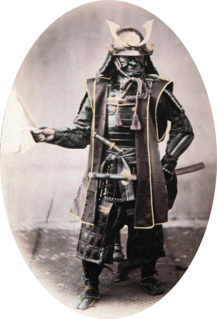
Bushidō is a moral code concerning samurai attitudes, behavior and lifestyle. There are multiple Bushido types which evolved significantly through history. Contemporary forms of bushido are still used in the social and economic organization of Japan. Bushido is also used as an overarching term for all the codes, practices, philosophies and principles of samurai culture. It is loosely analogous to the European concept of chivalry, but there are major differences.
Private property is a legal designation for the ownership of property by non-governmental legal entities. Private property is distinguishable from public property, which is owned by a state entity, and from collective or cooperative property, which is owned by a group of non-governmental entities. The distinction between private and personal property varies depending on political philosophy, with socialist perspectives making a hard distinction between the two. As a legal concept, private property is defined and enforced by a country's political system.

The just war theory is not a theory actually but a doctrine, also referred to as a tradition, of military ethics which is created and studied by military leaders, theologians, ethicists and policy makers. The purpose of the doctrine is to assert that a war is morally justifiable through a series of criteria, all of which must be met for a war to be considered just. The criteria are split into two groups: "right to go to war" and "right conduct in war" . The first group of criteria concerns the morality of going to war, and the second group of criteria concerns the moral conduct within war. There have been calls for the inclusion of a third category of just war doctrine dealing with the morality of post-war settlement and reconstruction. The just war doctrine asserts the belief that war, while it is terrible but less so with the right conduct, is not always the worst option. Important responsibilities, undesirable outcomes, or preventable atrocities may justify war. Opponents of the just war doctrine may either be claim to adhere to a stricter pacifist standard or they may be inclined toward a more permissive nationalist standard. In many cases, philosophers decided that individuals do not need to be plagued by a guilty conscience if they are required to fight. A few philosophers ennoble the virtues of the soldier while they also declare their apprehensions for war itself. A few, such as Rousseau, argue for insurrection against oppressive rule.

Virtue ethics are a class of normative ethical theories which treat the concept of moral virtue as central to ethics. Virtue ethics are usually contrasted with two other major approaches in normative ethics, consequentialism and deontology, which make the goodness of outcomes of an action (consequentialism) and the concept of moral duty (deontology) central. While virtue ethics does not necessarily deny the importance of goodness of states of affairs or moral duties to ethics, it emphasizes moral virtue, and sometimes other concepts, like eudaimonia, to an extent that other theories do not.
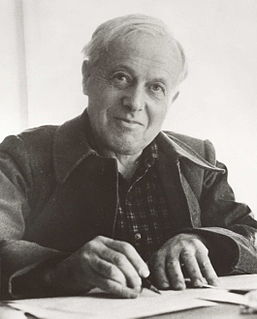
Eugen Rosenstock-Huessy was a historian and social philosopher, whose work spanned the disciplines of history, theology, sociology, linguistics and beyond. Born in Berlin, Germany into a non-observant Jewish family, the son of a prosperous banker, he converted to Christianity in his late teens, and thereafter the interpretation and reinterpretation of Christianity was a consistent theme in his writings. He met and married Margrit Hüssy in 1914. In 1925, the couple legally combined their names. They had a son, Hans, in 1921.

Freya von Moltke was a German American lawyer and participant in the anti-Nazi opposition group, the Kreisau Circle, with her husband, Helmuth James von Moltke. During World War II, her husband acted to subvert German human-rights abuses of people in territories occupied by Germany and became a founding member of the Kreisau Circle, whose members opposed the government of Adolf Hitler.
Charles Page Smith was an American historian, professor, author, and newspaper columnist. He served in the United States Army during World War II, for which he received a Purple Heart. He was also a community activist for the homeless in Santa Cruz, California.
Out of Revolution is a book by Eugen Rosenstock-Huessy (1888-1973), German social philosopher. The book counters conventional historiography as a “theory of history: how history should be understood, how historians should write about it,” as Harold J. Berman wrote in the introduction to the book. Page Smith, Reinhold Niebuhr, and Lewis Mumford all wrote of the significance of this work having new insights on the history of Western Civilization.
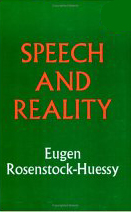
Speech and Reality is a book by Eugen Rosenstock-Huessy (1888–1973), German social philosopher and is an English-language introduction to Rosenstock-Huessy’s German-language book, Soziologie. It comprises seven essays that he wrote and revised between 1935 and 1955. Rosenstock-Huessy introduces a new form of social research in which the human subject, as speaker, displaces the subject of orthodox sociology, wherein the subject can be mute. Speech and Reality is an English-language introduction to Rosenstock-Huessy’s Soziologie (sociology) and his method of inquiry for the social sciences, which is based on grammar. Using grammar as a tool, Rosenstock-Huessy describes the preconditions of anarchy, revolution, decadence, and war. John Macquarrie emphasized the importance of Rosenstock-Huessy's language-based methods and Peter Leithart cited the scope of his thinking across the depth and breadth of society.

I Am an Impure Thinker is a book by Eugen Rosenstock-Huessy (1888-1973), German social philosopher and is an English-language introduction to Rosenstock-Huessy’s German-language book, Soziologie. It is a collection of essays, which represents an accessible introduction to Rosenstock-Huessy’s thought. The "impure thinker" title reflects the author’s escape from the bounds set by academic tradition, his belief that thought must be accompanied by passionate convictions and engagement, and that sterile intellect is a disease. While apparently unrelated, the essays nevertheless have an underlying unity, which runs through his discussion of the concepts of William James, the Gospels, the Egyptian symbol of Ka, and other uncommon sources. Together the essays contribute to the discovery of a post-theological language. They answer Dietrich Bonhoeffer’s question: “How can we speak of God to modern man who ‘has come of age?’” It has been recognized as a summary of Rosenstock-Huessy's insights into Western culture by such thinkers as W. H. Auden, Dietrich Bonhoeffer, Martin E. Marty, and Harold J. Berman.
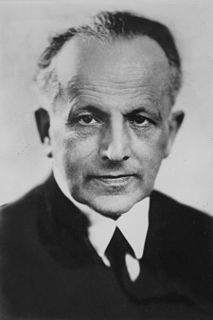
Hans Philipp Ehrenberg was a German Jewish philosopher and theologian. One of the co-founders of the Confessing Church, he was forced to emigrate to England because of his Jewish ancestry and his opposition to Nazism.

The Moral Equivalent of War speech was a speech in which US President Jimmy Carter addressed the people of the United States on April 18, 1977.
Norman Fiering is an American historian, and Director and Librarian, Emeritus, of the John Carter Brown Library.

Terry Allan Simmons was a Canadian-American lawyer and cultural geographer, and the founder of the British Columbia Sierra Club. In this role, he participated in the Don't Make A Wave Committee, understood as the origin of the environmental organization Greenpeace.
References
- ↑ "Then Again: The idea behind a Vermont camp birthed the Peace Corps". 22 August 2021.